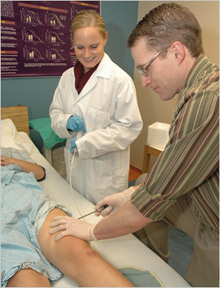How is DMD Diagnosed? Blood Tests
Blood tests are used determine the amount of the enzyme creatine phosphokinase (CPK). Elevated CPK levels indicate muscle damage. In DMD CPK may be 10 to 100 times the normal amounts. Although 70% of DMD carriers have raised CPK levels, normal levels do not rule out carrier status. DNA testing DNA testing is performed on blood or muscle cells to identify if there are any changes in the gene responsible for dystrophin. This method is thought to be accurate in 98% of cases, however a muscle biopsy is needed to detect the level of dystrophin for sure. |  Figure 6: Muscle Biopsy
|
Muscle biopsy
A muscle biopsy is the most reliable tool in diagnosing DMD. A sample of muscle is taken from the carrier and injected with a special dye enabling the tester to observe the amount of dystrophin. DMD is diagnosed if there is no dystrophin present.
Prenatal testing
A child may be at increased risk of being affected by DMD if one or both of the parents are “carriers” of the condition. There are several prenatal tests which can be carried out by DNA analysis of cells collected at various stages of pregnancy.
· 11-12 weeks: Chorionic villus sampling (CVS) is a form of prenatal diagnosis to determine chromosomal or genetic disorders in the fetus. It entails getting a sample of placental tissue and testing it. However, rate of foetal loss from procedure is approximately 1%.
- 14-16 weeks: Amniocentesis is a procedure in which a small amount of amniotic fluid, which contains fetal tissues, is extracted and the fetal DNA is examined for genetic abnormalities. This has a slightly smaller small risk of inducing miscarriage (approximately 0.05%)
- 18-24 weeks: Foetal muscle biopsy may be taken to detect the presence of dystrophin..
Earlier testing may allow early termination which may be potentially less traumatic for the parents, but there is a slightly higher risk of miscarriage than later testing. It is therefore important that the type of test used is discussed with a genetic counselor before a decision is made.
